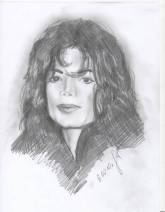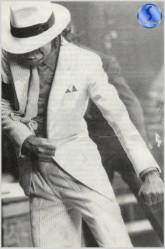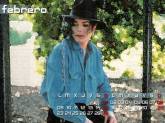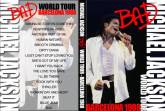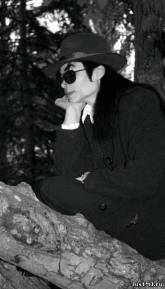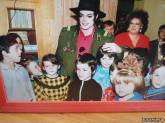| Главная » Тексты » Подробная информация о Майкле Джексоне » Интервью Майкла Джексона |
| The Michael Jackson Nobody Knows (Ebony Magazine; 1984) By Robert E. Johnson Associate Publisher, Jet As the kinetic and magnetic leader of The Jacksons, whose 1984 Victory Tour attracted the largest concert crowds and sold the most tickets in the history of show business, Michael Jackson is an extraordinary human being who is beyond category. Although he has been out front and outstanding for 20 years, the 26-year-old singer/songwriter/dancer and actor was not recognized as a super-super-star until his Thriller album became the best-selling LP of all time. Since then, much has been written about him, but the man behind the superstar is still a mystery and a media enigma. The White media’s Michael Jackson, portrayed mostly through gossip, rumors, hype, and sometimes slander, is not the Michael I have watched and reported on since he emerged from the anonymity of the steel town of Gary, Indiana in 1970. That Michael Jackson — the Michael Jackson nobody knows — is warm, sensitive, vibrant, keenly aware of the mysteries of life and the wonder and magic of children. Several months ago he told me that he was tired of the wave of lies in the White press. What he said then was reflected in the extraordinary and revealing statement he issued at a press conference through his manager, Frank Dileo: “For some time now, I have been searching my conscience as to whether or not I should publicly react to the many falsehoods that have been spread about me. I have decided to make this statement based on the injustice of these allegations and the far-reaching trauma those who feel close to me are suffering. “I feel very fortunate to have been blessed with recognition for my efforts. This recognition also brings with it a responsibility to one’s admirers throughout the world. Performers should always serve as role models who set an example for young people. It saddens me that many may actually believe the present flurry of false accusations.” “To that end, and I do mean END - “No! I’ve never taken hormones to maintain my high voice.” “No! I’ve never had my cheekbones altered in any way.” “No! I’ve never had cosmetic surgery on my eyes.” “YES!! One day in the future I plan to get married and have a family. Any statements to the contrary are simply untrue.” “Henceforth, as new fantasies are printed, I have advised my attorneys of my willingness to institute legal action and subsequently prosecute all guilty to the fullest extent of the law.” “As noted earlier, I love children. We all know that kids are very impressionable and therefore susceptible to such stories. I’m certain that some have already been hurt by this terrible slander. In addition to their admiration, I would like to continue to keep their respect.” Michael Joseph Jackson, whose middle name is his father’s first, earned respect the old-fashioned way — the same way he earned the title “The World’s Greatest Entertainer”. His Thriller album has sold over 35 million copies and is still selling. He earns an estimated $2 from the album’s $5 wholesale price and has pocketed some $70 million from worldwide sales. He organized and now heads corporations that handle his business affairs, including Michael Jackson, Inc., which handles profits from his album and video royalties; Experiments In Sound, which deals with new techniques in recording; and Optimum Productions, which produces his music videos and video versions of records of other artists. The top winner of record and video awards, he received an unprecedented eight American Music Awards, a record-breaking eight Grammy Awards, and the MTV Video Award. Born the fifth of six talented sons of Joseph and Katherine Jackson in Gary, Indiana, 26 years ago (August 29, 195, he is a positive thinker and a creative artist who is motivated by a deep concern for all of humankind and an unyielding love for his profession. His love for fans who have become admirers is, perhaps, without parallel. Love is what made Michael endure one of the most pressure-filled concert tours of his career. Even though The Jacksons Victory Tour is expected to gross over $70 million, he didn’t perform for the love of money. He said he did it for the love of family, fans, and favorite charities. Although it was projected that his parents, who organized the tour with boxing impresario Don King, could each earn $5 million and each brother pocket about $7.5 million, Michael announced that his share of the concert earnings would go to three worthy causes. They are the United Negro College Fund (UNCF), Camp Good Times for terminally ill children, and the T.J. Martell Foundation for Leukemia and Cancer research. He is also giving earnings from a special album called Let’s Beat It, to charity. He is doing it, he says, because children inspired him to write the hit single, Beat It, “Children are my biggest inspiration in anything I do,” Michael told this writer. “I adore children — crazy about them. I wanted to write a song, the type of rock song that I would buy….I wanted the kids to really enjoy it, the school kids, as well as the college kids,” said the sensitive songwriter whose two favorite songs are Tchaikovsky’s Nutcracker Suite and Peter and the Wolf. He spoke of the song, Be Not Always, which he wrote with a little help from his brother, Marlon. In the sensitive, sentimental song recorded in The Jacksons’ Victory album, Michael makes a tearful plea to change a world in which “mothers cry, babies die helplessly in arms…” He observed that all of his brothers feel the same way about children, “not just me.” Recalling that the late superstar Josephine Baker, an entertainer he admired, had a United Nations of children that she had adopted, Michael smiled broadly and said with assurance: “I’m going to have children of my own, but I’m going to adopt as many races as I can. That is what I’m going to do. I love children. Like Emmanuel Lewis (tiny, 12-year-old star of TV’s Webster series), he’s a real inspiration.” Nothing, however, inspires the proud performer more than his family and fans. He talked about this shortly after newspapers circulated reports that he had been spoiled by the success of his Thriller LP and the proliferation of music awards, which included EBONY’s American Black Achievement Award. “Because I have achieved a lot of broken records with Off The Wall [album] and I’ve been the lead singer for the longest and now with Thriller, which is the all-time best and everything, I’m not planning on leaving,” he said of a rumor that he plans to leave the Jacksons after the tour. “They are my brothers [Jackie, Jermaine, Tito, Marlon, and Randy] and I love them all dearly and I think the media begin to look for something to sell papers and they make up things and they twist them.” Michael said at the beginning of the tour, “I’m doing it for the joy of touring and the family as a whole, and for the kids out there who bought the records. I’m a stage addict. I have to be on the stage.” Once during an interview at his California home, where he still resides with his parents and sister, LaToya, Michael said, “I would like you to put this in quotations: ‘My main love for what I do is the admirers. I love the fans. Like when I’m doing a show and I see the fans out there dancing and screaming, excited, and we’re bringing that joy to them, that’s what I love most. And it’s just the greatest feeling in the world. You’re up there and you’re giving them that energy and that love and they’re just throwing it right back at you. And it’s great. And that’s my main love, the stage and making those admirers happy.’” As the interview continues, Michael talks of many subjects that reveal things about him that have been overlooked in the media’s rush for rumors. Here are some of his views: EBONY: You have to cope with a lot of stress and pressure in the entertainment business. People make all kinds of requests of you and propositions come from all directions. How do you cope with these stresses and pressures? MICHAEL: I cope with it in a way and I’m not calling myself Jesus because I would never even look at myself on the same level, but I’m comparing it to Jesus because what God gave to him was for a reason and he preached and people came about him and he didn’t get angry and push them aside and say leave me alone, I ain’t got time. EBONY: But you must encounter some fans who pressure you and provoke you. MICHAEL: I do get angry at times because there are those who will come up to you with the worst attitude and will say to you, ‘Sit down, sign my baby’s paper.’ They’ll throw it at you. I’ll say, ‘Do you have a pen?’ ‘You don’t have a pen? Well, go get one.’ That’s what they’ll actually tell me….I’m amazed by some of the people. They think they own you. And they’ll say to you, ‘Listen, I made you what you are.’ I say, ‘Wait a minute. You didn’t just buy it [album] to help me. You bought it because you like it and that’s true.’ EBONY: You are looked upon as a role model. You once appeared at the Chicago Public Library to encourage young people and adults to read, and a book marker souvenir was distributed with a quotation from you. Do you still enjoy reading? MICHAEL: I love to read. I wish I could advise more people to read. There’s a whole other world in books. If you can’t afford to travel, you travel mentally through reading. You can see anything and go any place you want to in reading. EBONY: Have you had a chance to do any reading related to the Black experience or in terms of Black history? MICHAEL: Oh, yes! I’m really thankful for what Mr. [John H.] Johnson has done in bringing books through Johnson Publications….I think it’s good to show we are contributing to the world in many ways. That’s what a lot of people think — that we haven’t. EBONY: How do you keep up with what Black people today are doing, saying, and thinking? And who are some of the people, other than your family and close associates, who influence your thinking? MICHAEL: I love the way [John H.] Johnson runs his organization. Seems like everybody’s really nice. I’m sure there are quarrels and things, but everybody’s very nice….and have such an influence on the young. People rule their lives by JET and EBONY. I mean, they get their information from those two magazines and the young kids, too. I’ll say, where did you read it? I read it in JET. And they keep up with what’s happening in JET and EBONY. And I think that’s wonderful…God, I admire people like Johnson and [Walt] Disney. I think they’re phenomenal. EBONY: You talk of the influence of books and people in your life. What part does travel play in shaping your attitudes and outlook on life? MICHAEL: I think before anybody gets married, they should really travel the world if they can. It’s the most incredible education I’ve ever had. I think it’s phenomenal. I mean just to see the different cultures of people, the different faces, to talk to people and just to learn and see….When I traveled I was amazed. When we first went to Switzerland, I almost started crying. I really did. EBONY: What touched you about that trip to bring about that emotional response? MICHAEL: The beauty. It’s like, oh, God, it’s crying out in the sky. It’s an incredible country and it inspires me to see these things — the mountains. The pictures don’t do justice to Switzerland. Then there’s the Netherlands and France. Gosh, they’re incredible, too! EBONY: Obviously, when you travel, you are more than a tourist, you are an observer. MICHAEL: Well, a lot of people just stay in the cities when they travel. They should get out and see the real country. Wherever you go, man-made things are man-made, but you gotta get out and see God’s beauty. EBONY: In your travels, what were some of the countries that impressed you most? MICHAEL: I’m gonna raise my hand on this one. I’ll say this. I always thought that the Blacks, as far as artistry, were a talented race of people. But when I went to Africa, I was even more convinced. They did some incredible things over there. [West African countries, including Senegal]. We went to one place out in the flatlands where all these Africans sell their crafts and everything. I went to this one hut where this guy made incredible carvings….He took a piece of wood and a hatchet-like thing and started chopping and I just sat there amazed. He carved a big face…dipped it in some water…dried it off and he gave it to me and I paid for it. EBONY: You seem impressed by African art but what about African music and dance? MICHAEL: When we came off the plane in [Dakar, Senegal] Africa, we were greeted by a long line of African dancers. Their drums and sounds filled the air with rhythm. I was going crazy, I was screaming. I said, ‘All right!’ They got the beat and they got the rhythm….I just was so glad about the whole thing. This is it, I said. This is where I come from. The origin…. EBONY: You were obviously impressed by your musical roots, so where do you think the Africans derived their musical influence? MICHAEL: Music started with nature. Music is nature. Birds make music. Oceans make music. Wind makes music. Any natural sound is music. And that’s where it started….You see, we’re just making a replica of nature, which is the sounds we hear outside. EBONY: Did your travels have any influence on the way you think about races of people? MICHAEL: The main thing that I hate most is ignorance, like the prejudice problems of America. I know it is worse in some other countries. But I wish I could borrow, like from Venezuela or Trinidad, the real love of color-blind people and bring it to America…. EBONY: You are making some observations with intense feelings. Please continue. MICHAEL: I’m prejudiced against ignorance. That’s what I’m mainly prejudiced against. It’s only ignorance and it’s taught because it’s not genetic at all. The little children in those [countries] aren’t prejudiced. I would like for you to put this in quotes, too. I’m really not a prejudiced person at all. I believe that people should think about God more and creation….Look at the many wonders inside the human body — the different colors of organs, colors of blood — and all these different colors do a different thing in the human body. It’s the most incredible system in the world; it makes an incredible building, the human being. And if this can happen with the human body, why can’t we do it as people? And that’s how I feel. And that’s why I wish the world could do more. That’s the only thing I hate. I really do. EBONY: What you have just said is not only compassionate but compelling. How do you communicate such feelings since you don’t make public appearances to express your views in public forums? MICHAEL: I try to write, put it in song. Put it in dance. Put it in my art to teach the world. If politicians can’t do it, I want to do it. We have to do it. Artists, put it in paintings. Poets, put it in poems, novels. That’s what we have to do. And I think it’s so important to save the world. EBONY: Stevie Wonder apparently shares similar feelings, judging by some of his musical messages. MICHAEL: That’s why I love Stevie Wonder’s biggest-selling album called Songs in the Key of Life. He has a song on that album called Black Man….I just jumped up screaming when I heard that record because he’s showing the world what the Black man has done and what other races have done, and he balanced it beautifully by putting other races in there, what they have done. Then he brings out what the Black Man has done. Instead of naming it another thing, he named it Black Man. That’s what I loved about it….And that’s the best way to bring about the truth, through song. And that’s what I love about it. EBONY: You don’t seem to have any objections to messages in music as long as the messages are positive. Your music, unlike some artists, stays clear of messages glorifying drugs. But drugs are a reality. How do you view it? MICHAEL: In the field I’m in, there is a lot of that and it gets offered to me all the time. People even go as far as to just…stick it in your pocket and walk off. Now, if it was a good thing, they wouldn’t do that….I mean, would somebody drop something beautiful in my pocket and just walk off? But I don’t want to have anything to do with any of that. I mean, as corny as it sounds, but this is how I really believe: Natural highs are the greatest highs in the world….Who wants to take something and just sit around for the rest of the day after you take it [drugs], and don’t know who you are, what you’re doing, where you are? Take in something that’s gonna inspire you to do greater things in the world. EBONY: Do you put God or religion in that process of a natural high? MICHAEL: Oh, yes, God, really. I believe in the Bible and I try to follow the Bible. I know I’m an imperfect person….I’m not making myself an angel because I’m not an angel and I’m not a devil either. I try to be the best I can and I try to do what I think is right. It’s that simple. And I do believe in God. EBONY: Do prayers or praying play a role in your life? MICHAEL: I pray every night. I don’t just pray at night. I pray at different times during the day. When I see something beautiful, whenever I see beautiful scenery — like when I’m flying or something — I say, oh, God, that’s beautiful. And I always say little prayers like that all through the day. I love beauty. EBONY: Speaking of beauty, you have been associated in a public way with many beautiful people, including your beautiful sisters, LaToya, Rebbie, and Janet, but also Diana Ross, Tatum O’Neal, and Brooke Shields. You have been linked romantically with the latter two. Someone said you and Tatum had a lot in common: the parents of both of you are protective — she’s a daddy’s [Ryan O’Neal] girl and you’re a momma’s [Katherine Jackson] boy. MICHAEL: I want all those people who read JET and EBONY to just know that we’re mainly good friends. That’s the main thing. I think for guys, girls make the best friends. And for girls, guys make the best friends . EBONY: What is your relationship with Brooke? When did you meet and has that relationship developed? MICHAEL: We met at the Academy Awards. She asked me to dance because I was not going to ask her. You know, I’m really shy and embarrassed. So she says, ‘I got to dance with you tonight.’ I said, great. So we got together on the dance floor and danced. They were playing that old-fashioned Benny Goodman, Tommy Dorsey music, which wasn’t much of a groove. First, you’ve got all these bald-headed old people on the floor slow dancing, the Lawrence Welk sound. We really couldn’t get into it so we got to talking and got to know each other. We switched numbers and had phone conversations back and forth and we became real good friends. EBONY: Does this mean that Brooke has replaced Tatum as a special friend? MICHAEL: Tatum calls me all the time and I hope she reads this interview because I’m sorry I couldn’t get all of her calls. But she’s still a wonderful friend of mine. EBONY: Both Tatum and Brooke are fine actresses. You did all right in The Wiz. What’s in the future for you now in films? MICHAEL: I’m very excited about a lot of things that I want to do and that I’m going to do in films and things. I really can’t wait….Since The Wiz, incredible offers have come to me, things that are still in the making. EBONY: You once said that you will be careful about choosing your next role so that you won’t be typecast anymore. You said that since The Wiz, some people still call you Scarecrow because of that character role you played. MICHAEL: Whatever role you play, people link it with your personality. But it’s acting. You’re portraying another person….I wish it wasn’t called acting because I don’t really like actors. I mean, the word acting. EBONY: Please elaborate. MICHAEL: I don’t think acting should be acting. Acting, if you’re acting, you’re imitating realism. You should create realism. It should be called believing. You see, I always was against it when I thought about acting. I don’t want to see an actor. I want so see a believer. I don’t want to see anybody that’s gonna imitate the truths. It’s not real then. I want to see a person that’s gonna believe the truth….That’s when you move an audience. EBONY: What kind of questions do you wish you would be asked but nobody ever asks you? MICHAEL: That’s a good question. Probably about children or writing, or what I just talked about….You don’t make a better world of minds and things when people put the wrong things in their lyrics and give the wrong views on stage and everything. It’s just so important and I think this can lead so many people astray, because an artist can be built up so big in his career that this could change the whole world by what he does and thinks. They’ll listen to him before the President or any of these big politicians. You have to be careful. They could change these peoples’ way of life by what they say and do. That’s why it’s important to give off love vibes and that’s why I love what I do….When Marvin Gaye put out the album, What’s Going On, so many Blacks as well as Whites — but mainly Blacks-were educated. ‘Wake up. What’s going on? Wake up.’ I mean the ones that don’t watch the news, don’t read the papers to really dig in the depths of humanism. What’s going on? Wake up. EBONY: There have been some campaigns against so-called dirty lyrics songs by some popular musical groups. Do you have any views about such groups and their lyrics? MICHAEL: Sometimes they go too far. They don’t leave anything for the imagination. If I just walked out on stage naked, there’s no imagination. I’m not letting them imagine what I look like without the clothes. But you see, they overdo it….We got to leave them something to imagine. People go too far at times. I think it’s important to set the right example because there are so many kids who look up to us. As the most productive year of his entertainment career comes to a close and his talents helped him gross about $100 million, Michael is not content to rest on his laurels or his loot. He faces a future guided by two observations, both of which he made: “I’m interested in making a path instead of following a trail and that’s what I want to do in life — in everything I do,” Michael told this writer in an interview on July 13, 1979. He made the other observation in his role as Scarecrow in The Wiz, a movie in which he co-starred with one of his dearest friends — Diana Ross. In a scene near the end of the film, Michael spoke these words through his Scarecrow character: “Success, fame, fortune — they are all illusions. All there is that is real is the friendship that two can share.” Those are the thoughts of the Michael Jackson nobody knows. Перевод Майкл Джексон. Интервью журналу Ebony, 1984 | |
| Подробная информация о Майкле Джексоне » Интервью Майкла Джексона | |
 0.0
(0) |
0.0
(0) |  3613 | 3613 |  0
| Добавил:
Galoshka 0
| Добавил:
Galoshka
| |
| Всего комментариев: 0 | |

